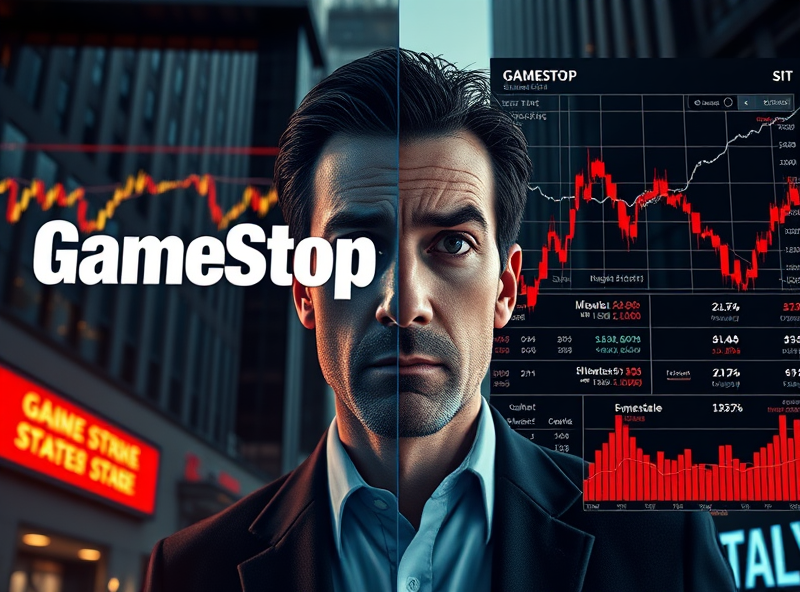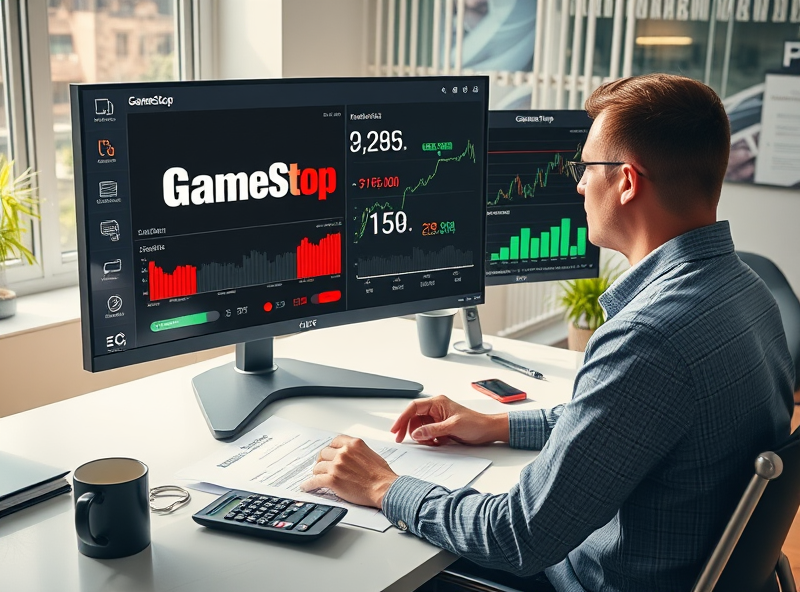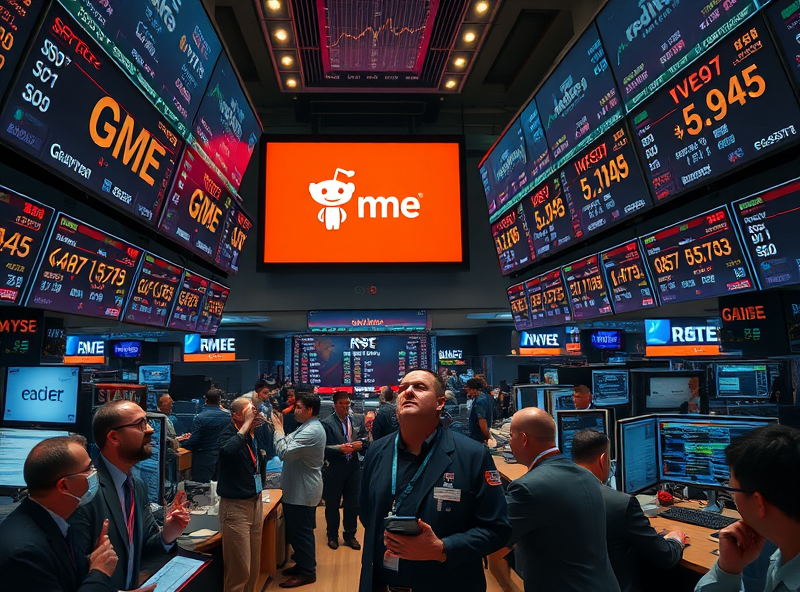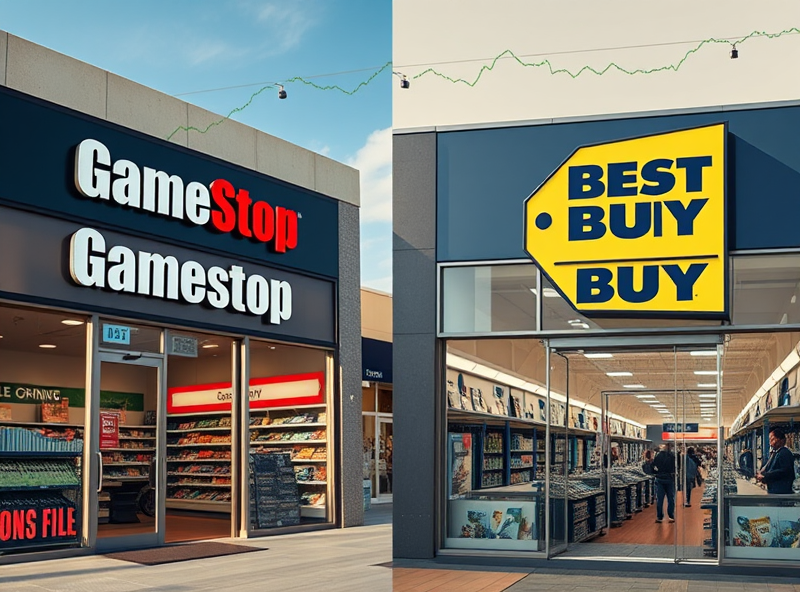
GameStop Stock Valuation: Is GME Truly Overpriced?
Intrinsic Value of GameStop: What Are the Numbers Telling Us?

When it comes to evaluating whether GameStop (GME) is overpriced, it’s essential to look beyond the hype and examine its intrinsic value — the true worth of the company based on fundamentals. Intrinsic value is typically calculated using methods like Discounted Cash Flow (DCF) analysis, which estimates the present value of a company’s future cash flows.
As of early 2024, GameStop’s market capitalization remains significantly higher than what traditional valuation models suggest. For example, GME’s price-to-earnings (P/E) ratio has often been far above the industry average, indicating that investors may be pricing in future growth that is not yet supported by the company’s financials. In the last fiscal year, GameStop reported declining revenues and marginal profitability, which raises questions about its long-term earnings potential.
Moreover, the company is in the midst of a strategic transition — shifting from a brick-and-mortar retail model to a more digital and e-commerce-driven approach. While this pivot could unlock new revenue streams, it also introduces uncertainty and requires significant investment. These factors should be weighed carefully when estimating the company’s intrinsic value.
Investors should also consider the role of speculative trading. The 2021 short squeeze, driven by retail investors on platforms like Reddit, significantly inflated GME’s stock price, decoupling it from its fundamentals. Although the stock has since stabilized, it still trades at a premium compared to its intrinsic value.
In conclusion, while GameStop has potential, especially if its digital transformation succeeds, current valuations appear to be driven more by sentiment than by solid financial performance. For long-term investors, it’s crucial to base decisions on thorough analysis rather than market noise.
For a detailed breakdown of GameStop’s financials, you can refer to their official SEC filings: https://www.sec.gov/edgar/browse/?CIK=1326380
Market Momentum and Speculative Drivers Behind GME

GameStop (GME) has become a symbol of retail investor enthusiasm and speculative trading, especially since the 2021 short squeeze. But beyond the headlines, what’s really driving its price today? Let’s explore the market momentum and speculative forces that continue to influence GME’s valuation.
Market momentum refers to the tendency of assets to continue moving in the same direction once a trend is established. In GME’s case, much of the upward price movement has been driven not by fundamental improvements in the company’s financials, but by investor sentiment, social media influence, and short-term trading dynamics. Platforms like Reddit’s r/WallStreetBets have played a major role in amplifying retail investor interest, often leading to sharp price surges that defy traditional valuation models.
Another key factor is the high short interest in GME stock. When many investors bet against a stock by shorting it, any sudden price increase can trigger a ‘short squeeze’—a rapid rise in price as short sellers rush to cover their positions. This phenomenon has happened multiple times with GME, creating volatile spikes that attract even more speculative traders.
Moreover, GME has become a ‘meme stock,’ where its value is partially driven by its cultural status and community backing rather than earnings or growth potential. This makes it susceptible to emotional trading and hype cycles, which can distort its market price far beyond its intrinsic value.
For long-term investors, it’s important to distinguish between price and value. While momentum can create opportunities for short-term gains, it also introduces significant risk. If you’re considering investing in GME, make sure to evaluate whether the current price reflects the company’s actual business performance or is primarily fueled by speculative forces.
For a deeper look into how market sentiment impacts stock prices, you can refer to this article by the CFA Institute: https://www.cfainstitute.org/en/research/cfa-digest/2019/05/market-sentiment-and-stock-returns
Intrinsic Value of GameStop: What Are the Numbers Telling Us?

When comparing GameStop (GME) to a traditional electronics retailer like Best Buy (BBY), it’s essential to look beyond the hype and focus on financial fundamentals. GameStop’s recent surge in stock price has been largely driven by retail investor enthusiasm and speculative trading, rather than improvements in core business performance. In contrast, Best Buy maintains a consistent track record of profitability, strong cash flow, and a sustainable business model.
Let’s break down the key metrics:
1. Revenue and Profitability: Best Buy generated over $43 billion in revenue in 2023 with a net income margin of around 3%. GameStop, by comparison, brought in approximately $5.9 billion with negative net income, indicating ongoing losses.
2. Price-to-Earnings (P/E) Ratio: GameStop’s P/E ratio is currently not meaningful due to its negative earnings. Best Buy trades at a reasonable P/E ratio of around 12–15, suggesting it is priced more in line with its earnings potential.
3. Balance Sheet Strength: While GameStop has made efforts to reduce debt and improve liquidity, Best Buy holds a more stable financial position with consistent dividend payments and share buybacks.
4. Business Model Viability: Best Buy has successfully integrated e-commerce and services like Geek Squad to remain competitive. GameStop, while attempting to pivot into digital and NFT markets, still relies heavily on a declining physical retail model.
In conclusion, while GameStop may still hold speculative appeal, its current valuation is difficult to justify based on traditional financial metrics. Investors should consider whether the stock price reflects actual business performance or simply market sentiment.
For more detailed financial comparisons, you can refer to official filings on the U.S. Securities and Exchange Commission (SEC) website: https://www.sec.gov
Investment Outlook for GME: Short-Term Hype vs. Long-Term Value

GameStop (GME) has become a symbol of retail investor power, especially after the 2021 short squeeze that sent its stock price soaring. But beyond the headlines and social media buzz, it’s essential to ask: is GME a viable long-term investment, or is it still riding the wave of short-term hype?
In the short term, GME’s stock price has been heavily influenced by speculative trading, social media sentiment, and short interest dynamics. These factors can create extreme volatility, making it difficult to assess the stock’s true value. While this volatility can offer trading opportunities, it also carries significant risk for retail investors who may be chasing momentum rather than fundamentals.
From a long-term perspective, the picture becomes more nuanced. GameStop has made efforts to pivot its business model, including leadership changes, e-commerce expansion, and investments in digital assets and NFTs. However, the core challenge remains: the traditional video game retail market is shrinking as digital downloads and cloud gaming become more dominant. Unless GameStop can successfully reinvent itself and find sustainable revenue streams, its long-term value may not justify its current valuation.
Fundamentally, GME’s price-to-earnings ratio and revenue growth do not currently support its elevated stock price. Analysts remain cautious, and many believe the stock is still overpriced relative to its intrinsic value. Investors should carefully evaluate whether the company’s strategic shifts are translating into measurable financial improvements.
In conclusion, while GME may still offer short-term trading potential due to its volatility and meme status, long-term investors should be cautious. It’s important to separate the noise from the numbers and base investment decisions on solid financial analysis rather than hype.
For a deeper look at GameStop’s financials, you can refer to the company’s latest SEC filings: https://www.sec.gov/edgar/browse/?CIK=1326380






